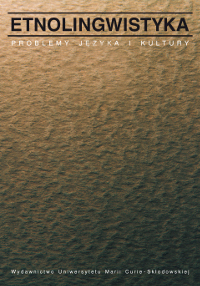Постулаты московской этнолингвистики
THE TENETS OF THE MOSCOW ETHNOLINGUISTIC SCHOOL
Author(s): Svetlana Michajlovna TolstajaSubject(s): Anthropology, Language studies, Language and Literature Studies, Theoretical Linguistics, Applied Linguistics
Published by: Wydawnictwo Naukowe Uniwersytetu Marii Curie-Sklodowskiej
Keywords: FOLKLOR; MYTHOLOGY; PROTO-SLAVIC HERITAGE; TRADITIONAL SPIRITUAL SLAVIC CULTURE
Summary/Abstract: The authoress presents the major assumptions, research methods and achievements of the Moscow ethnolinguistic school, created by Nikita I. Tolstoy in the 1970s. The school investigates and describes traditional spiritual Slavic culture on the basis of language, folklore, customs and beliefs. Research concerned with the reconstruction of the Proto-Slavic heritage embraces the culture of all Slavs in its regional differentiation. Language as a system of signs is taken as the major access route to culture; culture is similarly treated as a semiotic system. This allows one to employ, for the study of culture, the conceptual apparatus and methods of linguistics.Language and culture are viewed as isomorphic and connected in the sense that linguistic signs (words) and cultural signs (rituals, artifacts etc.) complement and substitute for each other in their functions of coming to the knowledge of the world, communicating, operating in the society and others. However, language and culture differ in the nature of their respective signs: linguistic signs are specific, cultural signs are not, because symbolic meanings are also ascribed to purely practical behaviours and objects. Motivations of symbolic meanings may be captured in the behavioural and belief-related context: they are usually based on objective features of the referents, their appearance and functions. Signs of culture, too, are homonymic and synonymic. In the Moscow school, symbolic and mythological meanings are distinguished from purely linguistic meaning; they are treated as cultural, not linguistic connotation. The ethnolinguistic research of the school is open to inspiration from linguistic pragmatics, text analysis, cognitive and anthropological linguistics. Of two understandings of ethnolinguistics, a narrower and a broader one, it is the latter that has received more support in the Moscow circle: the conception treats linguistic, folk and ethnographic data as the basis for arriving at the mentality of a group. This is the common denominator of the two Slavic ethnolingusitic schools: in Moscow and Lublin, Poland. The most important achievements of Moscow ethnolinguists, who have so far published over three thousand studies, are presented as well.
Journal: Etnolingwistyka. Problemy Języka I Kultury
- Issue Year: 18/2006
- Issue No: 18
- Page Range: 7-27
- Page Count: 21
- Language: Russian

